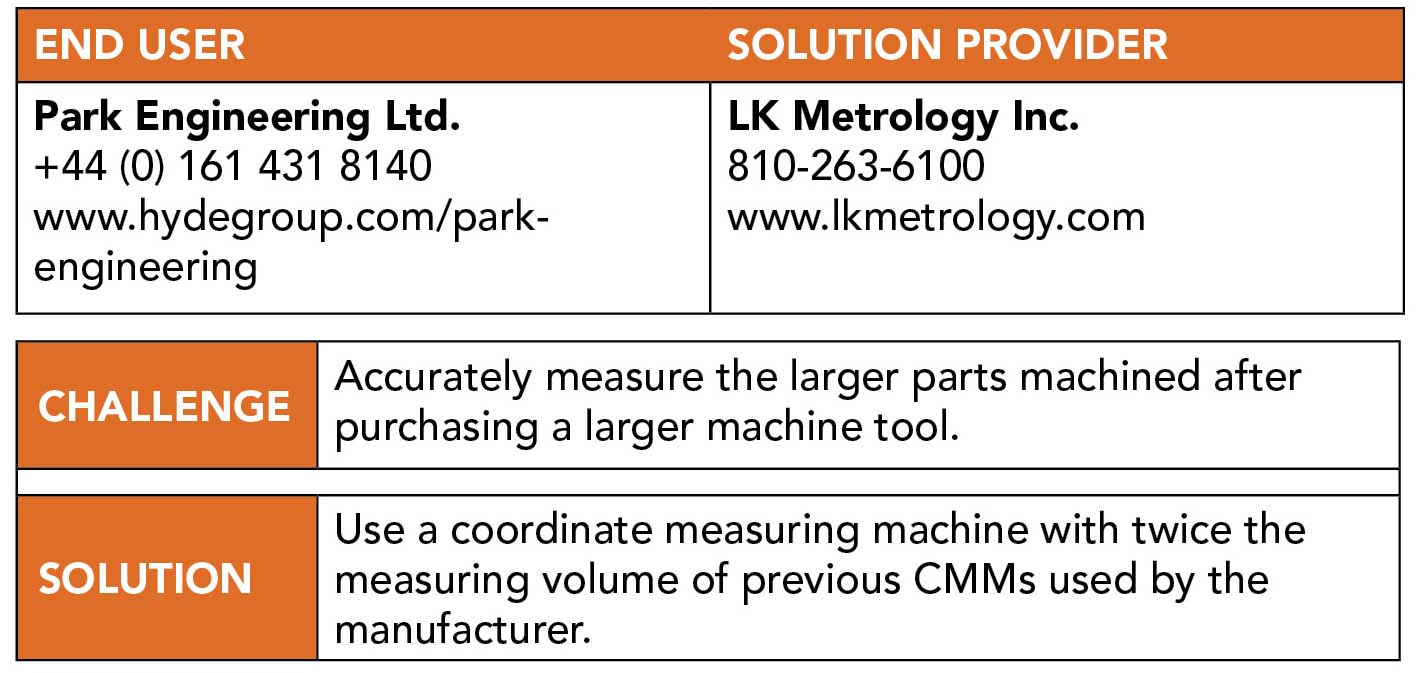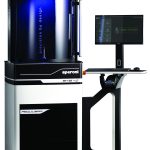Measuring large
Measuring large
New CMM from LK Metrology doubles company's parts measuring volume
Stalybridge, England-based engineering company Park Engineering Ltd. has significantly increased the size of parts that it can machine and subsequently measure on a coordinate measuring machine. This capability follows the installation at the start of 2022 of two new machines: a Spanish-built Correa Fox 50 five-axis machining center with a 5 m × 3.25 m × 1.6 m (16.4'×10.7'×5.2') working envelope, which is nearly 16% larger than the prior largest machine, and an Altera M 30.20.15 CMM with 3 m × 2 m × 1.5 m (9.8'×6.6'×4.9') axis travels built by LK Metrology Ltd. in Castle Donington, United Kingdom. (LK Metrology Inc. is in New Hudson, Michigan.) Compared with the biggest of three LK CMMs previously operated by Park Engineering, this machine offers twice the measuring volume.
Park Engineering specializes in the design, manufacture, assembly and certification of tooling jigs and fixtures for the aerospace, nuclear, defense and automotive industries, so the company is accustomed to managing large components. It also provides subcontract machining services. When looking to invest in new technology to offer even larger capacity, there was a desire to inspect the bigger parts on a CMM platform rather than a portable measuring system, which may have a big measuring volume but is usually lower in accuracy than a CMM.
Park Engineering first encountered LK Metrology in the mid-1990s when buying a 10-year-old, 2.5 m × 1.5 m × 1.2 m (8.2'×4.9'×3.9') capacity G80K CMM. Its performance, coupled with LK Metrology's ability to provide control and software upgrades, prompted the purchase a few years later of another used LK CMM: a G80C.

The metrology department continued in this vein, adding a new LK Integra 10.10.8 with a measuring volume of 1 m × 1 m × 0.8 m (3.3'×3.3'×2.6') in 2007 for quality control of small, tight-tolerance aerospace components.At the time, Park Engineering conducted all its activities at a factory in Reddish, England, but the company relocated in the second half of 2021 to larger premises owned by Hyde Group in Stalybridge. In the process, the company decided to upgrade its machining and measuring technologies and capacities, which included retiring the two older CMMs and replacing them with a new, bigger machine. Because of his long-term experience with the reliability of LK CMMs and its customer service, Quality Manager Will Reeves said he examined other CMM suppliers but saw no reason to change."The process only served to underscore LK's reputation and reaffirm the trust we have in them as a preferred supplier," he said. "The fact that it is a U.K. manufacturer is an added benefit as it means that the in-depth engineering expertise in the factory is local to us, should it be required."Reeves said discussions with LK Metrology soon identified the ideal size of the new CMM to be installed: the Altera M 30.20.15."The increase in speed and accuracy of the Altera M, which is around six times faster and 216% more accurate than the oldest of our previous CMMs, was a great selling point," he said. "But we were also delighted to have a larger-capacity CMM with a smaller overall footprint."Will Reeves, quality manager at Park Engineering, sets up an aluminum free-form surface-profiled part for measurement on the LK Altera M 30.20.15 CMM in an air-conditioned room. Image courtesy of LK Metrology
In day-to-day operations, the Altera M CMM supports the inspection of large parts with drawing tolerances of typically ±50 µm (0.002"), but it is sufficiently accurate to measure smaller parts with tolerances as tight as ±10 µm (0.0004"). Irrespective of tolerances, LK Metrology's software application Camio, with its user-friendly operator interface, allows CNC programs to be generated either online or offline for the inspection of batch quantities, further reducing inspection time and cost, especially when CAD models are available.
"Across the broad spectrum of work packages, we have access to CAD models approximately 50% to 60% of the time, with the remainder being work to print," Reeves said. "However, the provision of CAD models is something we are always encouraging our customers to provide as it minimizes the risk of incorrect data being entered due to human error during the programming process."
He said Camio also saves time by automatically generating comprehensive reports that Park Engineering is able to send to customers with inspected components.
"The professional appearance of the documentation adds to the perceived professionalism of the service we provide," Reeves said. "The new metrology platform is significantly more productive than our old G80K and the G80C put together, as well as being more accurate. Along with the Integra, it puts Park Engineering in a good position to provide metrology support not only to our own production but also to external customers that want subcontract measurement support now and into the long-term future."





